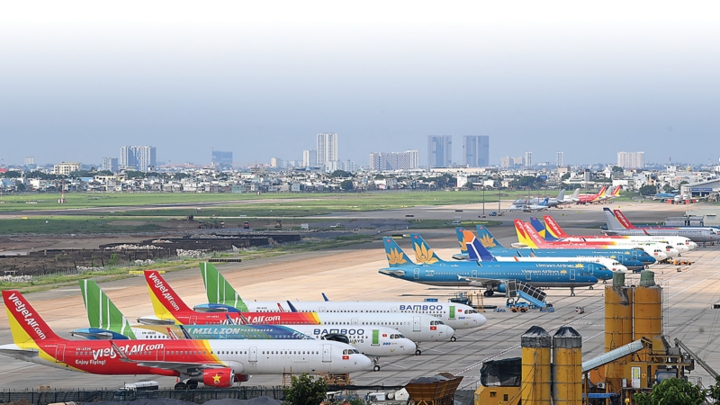Bamboo Airways has announced that in order to meet the peak Tet holiday demand of passengers, the airline has “wet leased” 2 aircraft and a number of flight attendants, pilots, depending on each aircraft and negotiations between the parties.
Vietnam Airlines has also increased an additional 4 wet-leased Airbus A320 aircraft (including aircraft and crew), thereby helping the airline to add nearly 1,000 flights during this period.
The first additional aircraft had landed at Tan Son Nhat airport on the afternoon of January 25 and was put into operation the next day. Vietnam Airlines will receive the remaining aircraft in early February 2024.
Meanwhile, Vietjet has also leased aircraft from FreeBrid Airlines to increase flights during Tet holiday.
However, representatives of the airlines have all stated that wet-leasing aircraft does not cause an increase in Tet airfare because all costs have been carefully calculated in advance.
Agreeing with this opinion, aviation expert Nguyen Thien Tong believes that leasing aircraft and foreign crew members are definitely part of the pre-planned strategy. Although costs will affect ticket prices, they have also been calculated and balanced by the airlines before implementation.

Airlines continuously wet-lease foreign aircraft to increase flights during Tet holiday. Illustrative image.
Why do airfares for Tet holiday increase?
Denying that wet-leasing aircraft is the reason for the increase in airfares, a Bamboo Airways representative stated that one of the reasons for this situation is that airlines have to balance the two-way costs according to the market’s regulatory rules. If Tet ticket prices do not increase to compensate for empty flights, the airlines will incur losses, as all flights have to bear the same costs including parking fees, fuel, crew members, aircraft maintenance, etc.
During Tet holiday, there are usually a lot of passengers flying on certain routes in the outbound direction, while the return direction is empty.
“Although the prices increase, they still fall within the regulations for ceiling and floor prices,” said the Bamboo representative.
Dinh Viet Thang, Director of the Civil Aviation Authority of Vietnam, also confirmed that during the peak Tet period, all flights of the airlines have to accept a busy outbound direction, while the return direction either have very few passengers or is completely empty.
“Every year, it is the same, before Tet, the flights from the South to the Central and the North will be fully booked, while the return direction will mostly be empty. After Tet, the flights from the North and the Central to the South will be fully booked, while the return direction will be empty. Even with few passengers or no passengers at all, the planes still have to adhere to the registered slots.”
“In principle, when calculating ticket prices, the airlines have to calculate both outbound and inbound costs so as to compensate for the expenses. If only one direction is taken into account, the airlines cannot find a source to compensate for the costs,” said Thang.
Data from the Civil Aviation Authority shows that if regular flights or summer flights are fully booked in both directions, Tet flights are mostly unbalanced, with one direction fully booked and the other direction either empty or with a very low passenger rate, reaching only 20-25% of the total seats.
For example, before Tet, the proportion of both inbound and outbound flights from Hanoi and airports in the North to Ho Chi Minh City was quite low. The Vinh – Ho Chi Minh City route on February 2 had a seat occupancy rate of 7.91%, the Thanh Hoa – Ho Chi Minh City route: 11.98%; on February 3, the Vinh – Ho Chi Minh City route: 17.02%, the Binh Dinh – Ho Chi Minh City route: 16.62%…
Meanwhile, the routes from Ho Chi Minh City to airports in the North after Tet are also quite weak. Specifically, on February 4, the Ho Chi Minh City – Pleiku route had a ticket booking rate of 16.61%, the Ho Chi Minh City – Tuy Hoa route: 16.87%; on February 8, the Ho Chi Minh City – Buon Ma Thuot route: 11.19%…
Does cutting routes lead to increased airfares?
Recently, many airlines have cut routes for various reasons.
For example, in order to restructure operations, Bamboo Airways has reduced the frequency of flights on the Hanoi – Buon Ma Thuot, Phu Quoc, Cam Ranh routes; the Ho Chi Minh City – Hue, Chu Lai, Vinh routes…
Or recently, the People’s Committee of Thanh Hoa province has proposed that the Civil Aviation Authority direct Vietnamese businesses and airlines to resume services for routes temporarily suspended to Tho Xuan airport, including routes from Thanh Hoa to Can Tho, Nha Trang, Buon Ma Thuot, Da Lat, Phu Quoc and vice versa.
Similarly, the People’s Committee of Quang Binh province has also sent a request letter to the airlines to strengthen the capacity of the Dong Hoi – Hanoi, Dong Hoi – Ho Chi Minh City routes. According to Quang Binh province, in the past period, the Hanoi – Dong Hoi and vice versa route with a frequency of 1-2 flights per day, the Ho Chi Minh City – Dong Hoi and vice versa route with an average frequency of 3-4 flights per day, have not met the travel demand of passengers on this route.
However, according to Bui Minh Dang, Deputy Head of the Air Transport Division (Civil Aviation Authority), the reduction of some short routes by certain airlines does not affect ticket prices, because when one airline reduces frequencies, other airlines will supplement.
For example, the Ho Chi Minh City – Vinh route used to have just over 30 flights operated by 4 airlines, but when Bamboo Airways and Vietravel Airlines reduced frequencies, Vietnam Airlines and Vietjet Air supplemented and increased the number to 40 flights per day. During the peak Tet period, this route increased by 70% compared to normal days.
“Higher fares during Tet holiday are due to the market’s supply and demand rule, and airlines have to compensate for empty return flights,” said Dang.
Aviation expert Nguyen Thien Tong also analyzed: “Increasing ticket prices is a common issue during Tet time every year, not just for a single year, and it has been implemented according to the regulations on ceiling and floor prices since 2015. To calculate the cost of a flight, airlines have to consider both the outbound and inbound costs.“












